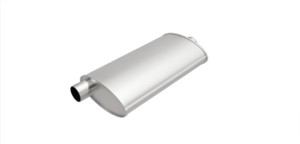The rumble of a classic engine is music to the ears of car enthusiasts. However, that pleasant sound can quickly turn into an irritating roar, or worse, a concerning rattle, if your muffler is failing. For owners of older vehicles, muffler problems are a common concern. Rust, wear and tear, and the simple passage of time can take their toll on your exhaust system. If you’re dealing with a noisy exhaust on your beloved older car, you’re likely wondering: “How much to repair a muffler on an old car?”
Understanding the costs associated with muffler repair is crucial for maintaining your vintage vehicle without breaking the bank. While the factors influencing muffler replacement costs are generally similar across all vehicles, older cars present some unique considerations. This article will delve into the specifics of muffler repair costs for older cars, helping you navigate the process and make informed decisions.
Factors Influencing Muffler Repair Cost on Older Cars
Several factors can affect the price you’ll pay to repair or replace the muffler on your older vehicle. These can be broadly categorized into parts, labor, and the specific challenges that come with older automobiles.
Vehicle Make and Model (and Age!)
Just like with newer cars, the make and model of your older vehicle play a significant role. However, for older cars, age is an additional critical factor. Parts for classic or less common older models can be more expensive and harder to source. Luxury or performance cars from past eras also typically had more complex exhaust systems, which can translate to higher repair costs today.
 muffler replacement cost factors for older cars
muffler replacement cost factors for older cars
Rust and Corrosion: A Major Issue for Older Cars
Rust is the nemesis of older vehicles, and exhaust systems are particularly vulnerable. Mufflers are located underneath the car, exposed to road salt, moisture, and debris. Over years, this leads to significant corrosion. Rust complicates muffler repairs on older cars in several ways:
- Increased Labor: Rusty bolts and connections are difficult to remove, requiring extra time and effort from mechanics. They may need to use penetrating oil, heat, or even cutting torches, increasing labor costs.
- Damage to Surrounding Parts: Corrosion can spread to exhaust pipes, hangers, and other components. What might seem like a simple muffler replacement could turn into a more extensive exhaust system repair if surrounding rusted parts also need attention.
- Part Availability: For very old or obscure models, finding direct replacement mufflers can be challenging. Mechanics might need to fabricate custom parts or adapt universal mufflers, which can add to the cost.
Condition of the Existing Exhaust System
In older cars, it’s rare for just the muffler to fail in isolation. Often, the entire exhaust system is showing its age. A thorough inspection might reveal that along with the muffler, sections of exhaust pipe, the catalytic converter (if applicable to the age of your car), or exhaust hangers also need replacement. Addressing these issues proactively can save money in the long run by preventing further breakdowns and ensuring the entire system is sound.
Labor Costs for Vintage Vehicle Repair
Labor costs vary depending on your location and the mechanic’s shop. However, mechanics with experience working on older cars may charge a premium. Repairing older vehicles can be more complex and require specialized knowledge. Finding a mechanic who is comfortable and experienced with vintage automobiles is often worth the extra cost to ensure the job is done correctly.
Parts Availability and Type for Older Mufflers
As mentioned before, finding original equipment (OE) replacement mufflers for older cars can be difficult and expensive. Aftermarket mufflers are generally more readily available and affordable. However, for classic cars, maintaining originality might be a priority. This could mean sourcing a more expensive OE-style muffler or even having one custom-made. The choice between aftermarket and OE-style parts will impact the overall cost.
Average Muffler Repair Cost for Old Cars
Given these factors, what’s the average cost to repair a muffler on an old car? It’s important to understand that prices can vary widely. However, we can provide a general range.
For a straightforward muffler replacement on a common older car model, you might expect to pay between $200 and $600, including parts and labor. This assumes a standard aftermarket muffler is used and no major complications arise due to rust or other exhaust system issues.
If your older car requires a more complex repair due to extensive rust, or if you opt for an OE-style or custom muffler, the cost can easily exceed $800 or even $1000+.
Here’s a breakdown of potential costs:
- Aftermarket Muffler (basic): $75 – $250
- OE-Style Muffler (for older cars): $200 – $500+
- Labor (1-3 hours, depending on complexity and rust): $100 – $300+
- Additional Parts (pipes, hangers, clamps): $50 – $200+
It’s always best to get a quote from a qualified mechanic who can inspect your specific vehicle and provide an accurate estimate based on its condition and your desired parts.
DIY vs. Professional Muffler Repair for Older Vehicles
For mechanically inclined owners, DIY muffler replacement can seem like a way to save money. While it’s possible, DIY muffler repair on older cars comes with extra challenges:
DIY Pros:
- Cost Savings: You save on labor costs.
- Personal Satisfaction: The reward of fixing it yourself.
DIY Cons (especially for older cars):
- Rust and Corrosion: Dealing with rusty bolts and exhaust components is significantly harder for DIYers without professional tools and experience.
- Safety: Working under a car requires safety precautions. Rusty exhaust systems can be brittle and dangerous.
- Tools and Equipment: You’ll need specific tools like a reciprocating saw, wrenches, and potentially welding equipment if modifications are needed.
- Time and Expertise: What seems like a simple job can become complex, especially if you encounter unexpected problems.
Professional Repair Pros:
- Expertise and Experience: Mechanics are familiar with exhaust systems and the challenges of older cars.
- Proper Tools and Equipment: They have the right tools to handle rusty components and ensure a proper installation.
- Safety: They have lifts and safety equipment for working under vehicles.
- Warranty: Reputable shops often offer warranties on parts and labor.
Professional Repair Cons:
- Higher Cost: Labor charges add to the overall expense.
Recommendation: For older cars, professional muffler repair is generally recommended, especially if you are not experienced with auto repair or if your exhaust system shows signs of significant rust. The expertise and equipment of a professional can save you time, frustration, and potential safety hazards.
Tips for Saving Money on Old Car Muffler Repair
While muffler repair for older cars can be costly, there are ways to manage expenses:
- Get Multiple Quotes: Contact several mechanics to compare estimates.
- Consider Aftermarket Mufflers: Unless originality is paramount, aftermarket mufflers are usually more affordable than OE.
- Ask About Package Deals: Some shops offer package deals that include muffler and pipe replacement if needed.
- Inspect the Entire Exhaust System: Addressing other potential issues proactively can prevent future costly repairs.
- Maintain Your Exhaust System: Regular inspections can catch minor issues before they become major problems. In rust-prone areas, consider undercarriage washes to remove road salt.
Maintaining Your New Muffler on an Old Car
Once you’ve invested in a new muffler for your older car, proper maintenance can extend its lifespan:
- Regular Inspections: Check for signs of rust or damage during routine maintenance.
- Address Leaks Promptly: Small exhaust leaks can worsen over time and damage the muffler and surrounding components.
- Avoid Short Trips: Short trips don’t allow the exhaust system to fully heat up, leading to condensation buildup and increased rust.
- Consider Rust Prevention: In rust-prone areas, applying rust inhibitors to the undercarriage and exhaust system can help.
Conclusion
Repairing a muffler on an old car can range from a moderate expense to a significant investment, depending on the vehicle’s age, condition, and your repair choices. Understanding the factors that influence cost, considering DIY versus professional repair, and taking steps to save money and maintain your new muffler will help you keep your classic car running smoothly and sounding right without emptying your wallet. Don’t let a noisy exhaust detract from the joy of owning an older vehicle – address muffler issues promptly and enjoy the ride!
FAQ: Muffler Repair on Old Cars
Is muffler repair more expensive on older cars?
Yes, generally. Older cars often have more rust and corrosion, making repairs more labor-intensive. Parts for older or classic cars can also be pricier and harder to find.
Can I use universal mufflers on an old car?
Yes, universal mufflers can be an option, especially for older cars where direct replacements are scarce. However, they might require modifications to fit properly, and the sound may not be exactly the same as the original.
How long will a new muffler last on an old car?
The lifespan of a new muffler on an old car depends on factors like climate, driving conditions, and muffler quality. Generally, a good quality muffler should last 5-7 years, potentially longer in drier climates or with proper maintenance.
Should I replace the entire exhaust system on a very old car?
If your older car’s exhaust system is heavily rusted and failing in multiple areas, replacing the entire system might be a worthwhile investment. It can be more cost-effective in the long run than piecemeal repairs and ensures all components are in good condition.
What are signs my old car needs a new muffler?
- Increased exhaust noise: Louder than usual rumbling, roaring, or hissing sounds.
- Rattling or banging noises: Often indicate loose components or internal muffler damage.
- Visible rust or damage: Holes, cracks, or excessive rust on the muffler.
- Reduced fuel efficiency: Exhaust leaks can affect engine performance and fuel economy.
- Failed emissions test: A damaged muffler can contribute to emission failures.


